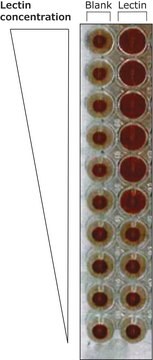AG733
Tamm-Horsfall Glycoprotein
Synonym(e):
THP, UMOD, Uromodulin
Anmeldenzur Ansicht organisationsspezifischer und vertraglich vereinbarter Preise
Alle Fotos(1)
About This Item
UNSPSC-Code:
12352200
eCl@ss:
32160405
NACRES:
NA.41
Empfohlene Produkte
Biologische Quelle
human
Qualitätsniveau
Assay
>95%
Form
solid
Hersteller/Markenname
Chemicon®
Methode(n)
activity assay: suitable
NCBI-Hinterlegungsnummer
UniProt-Hinterlegungsnummer
Versandbedingung
wet ice
Angaben zum Gen
human ... UMOD(7369)
Verwandte Kategorien
Allgemeine Beschreibung
Research area: Immuno and CKS
Tamm-Horsfall glycoprotein (THGP) also known as uromodulin is abundantly present in mammalian urine. It is highly expressed in the thick ascending limb of the Henle′s loop in the kidney. This protein consists of three epidermal growth factor (EGF) domains and a zona pellucida-like domain. THGP is a member of the glycosylphosphatidylinositol (GPI) protein family and is attached to the cell membrane by a C-terminal GPI- anchor. The THGP gene is located on the human chromosome at 16p12.3.
Tamm-Horsfall glycoprotein (THGP) also known as uromodulin is abundantly present in mammalian urine. It is highly expressed in the thick ascending limb of the Henle′s loop in the kidney. This protein consists of three epidermal growth factor (EGF) domains and a zona pellucida-like domain. THGP is a member of the glycosylphosphatidylinositol (GPI) protein family and is attached to the cell membrane by a C-terminal GPI- anchor. The THGP gene is located on the human chromosome at 16p12.3.
Anwendung
Tamm-Horsfall Glycoprotein has been used in luciferase activity assay of immortalized proximal tubular cells and human primary proximal tubular epithelial cells. It has also been used as a standard for calibration of uromodulin in urine samples.
Biochem./physiol. Wirkung
Tamm-Horsfall glycoprotein (THGP) may play a role in antibacterial host defense, inflammatory kidney disease, and the urogenital tract. It exhibits protective effects against kidney stone formation by reducing the calcium oxalate precipitation. Mutations in the THGP gene lead to familial juvenile hyperuricemic nephropathy (FJHN), glomerulocystic kidney disease (GCKD), and medullary cystic kidney disease type 2 (MCKD-2).Tamm-Horsfall Protein (THP) mediates the formation of mucous coat of the bladder, thereby regulating the permeability of the ascending loop of Henle. THP is known to adhere to Escherichia coli strains with type 131 and type S32 fimbriae, thereby blocking their interaction with the uroepithelium. Additionally, THP activates cells by directly signaling through Toll-like receptor 4 (TLR4). It has been demonstrated that THP stimulates the production of tumor necrosis factor-alpha (TNF-α) and tissue factor in monocytes through TLR4.
Physikalische Form
Lyophillized from deionized water containing 0.02% sodium azide.
Lagerung und Haltbarkeit
Store +2-8°C for up to 3 months after date of receipt.
DO NOT FREEZE.
DO NOT FREEZE.
Rechtliche Hinweise
CHEMICON is a registered trademark of Merck KGaA, Darmstadt, Germany
Haftungsausschluss
Unless otherwise stated in our catalog or other company documentation accompanying the product(s), our products are intended for research use only and are not to be used for any other purpose, which includes but is not limited to, unauthorized commercial uses, in vitro diagnostic uses, ex vivo or in vivo therapeutic uses or any type of consumption or application to humans or animals.
Lagerklassenschlüssel
11 - Combustible Solids
WGK
WGK 1
Flammpunkt (°F)
Not applicable
Flammpunkt (°C)
Not applicable
Analysenzertifikate (COA)
Suchen Sie nach Analysenzertifikate (COA), indem Sie die Lot-/Chargennummer des Produkts eingeben. Lot- und Chargennummern sind auf dem Produktetikett hinter den Wörtern ‘Lot’ oder ‘Batch’ (Lot oder Charge) zu finden.
Besitzen Sie dieses Produkt bereits?
In der Dokumentenbibliothek finden Sie die Dokumentation zu den Produkten, die Sie kürzlich erworben haben.
Julie A D Van et al.
Molecular & cellular proteomics : MCP, 19(3), 501-517 (2019-12-28)
Chronic hyperglycemia is known to disrupt the proteolytic milieu, initiating compensatory and maladaptive pathways in the diabetic kidney. Such changes in intrarenal proteolysis are captured by the urinary peptidome. To elucidate the early kidney response to chronic hyperglycemia, we conducted
Aparna Renigunta et al.
The Journal of biological chemistry, 286(3), 2224-2235 (2010-11-18)
Tamm-Horsfall glycoprotein (THGP) or Uromodulin is a membrane protein exclusively expressed along the thick ascending limb (TAL) and early distal convoluted tubule (DCT) of the nephron. Mutations in the THGP encoding gene result in Familial Juvenile Hyperuricemic Nephropathy (FJHN), Medullary
Noel Edwards et al.
Nephrology, dialysis, transplantation : official publication of the European Dialysis and Transplant Association - European Renal Association, 32(12), 1994-1999 (2017-06-13)
Heterozygous mutations in UMOD encoding the urinary protein uromodulin are the most common genetic cause of autosomal dominant tubulointerstitial kidney disease (ADTKD). We describe the exceptional case of a patient from a consanguineous family carrying a novel homozygous UMOD mutation
Unser Team von Wissenschaftlern verfügt über Erfahrung in allen Forschungsbereichen einschließlich Life Science, Materialwissenschaften, chemischer Synthese, Chromatographie, Analytik und vielen mehr..
Setzen Sie sich mit dem technischen Dienst in Verbindung.